Biological factors of alcoholic liver disease progression
- Authors: Ogurtsov PP1, Polikarpova TS1, Garmash IV1, Arisheva OS1, Guschin АE1, Tarasenko EV1, Myandina GI1
-
Affiliations:
- Peoples Friendship University of Russia
- Issue: No 3 (2012)
- Pages: 26-30
- Section: Articles
- URL: https://journals.rudn.ru/medicine/article/view/3609
- ID: 3609
- Retraction date: 21.02.2018
- Retraction reasons description:
The reason: duplicate publication (Journal of Scientific Articles Health and Education in the XXI Century. 2012. V. 14. No. 2. P. 140-141).
Cite item
Full Text

Abstract
The polymorphism t174m of angiotensinogen gene AGT was investigated as one of the risk factor of alcoholic liver lesion. The allelic variant m of angiotensinogen gene AGT is more frequent (15.8%) in patients with alcoholic liver cirrhosis and alcohol abuse without cirrhosis (n = 98) than in population (6.7%, n = 52; p = 0.04). The highest frequency of allele m was in a group with alcoholic liver cirrhosis (17.3%; p = 0.058). Our data provides the evidence that polymorphism t174m of AGT gene does not influence the progression (clinical picture) of alcoholic liver cirrhosis, except the level of GGT, which is increased in patients with homozygous genotype tt.
About the authors
P P Ogurtsov
Peoples Friendship University of Russia
Email: POGURTSOV@yandex.ru
Кафедра госпитальной терапии; Российский университет дружбы народов; Peoples Friendship University of Russia
T S Polikarpova
Peoples Friendship University of Russia
Email: rudnvestnik@yandex.ru)
Кафедра госпитальной терапии; Российский университет дружбы народов; Peoples Friendship University of Russia
I V Garmash
Peoples Friendship University of Russia
Email: Igarmash@bk.ru
Кафедра факультетской терапии; Российский университет дружбы народов; Peoples Friendship University of Russia
O S Arisheva
Peoples Friendship University of Russia
Email: olga.arisheva@yandex.ru <mailto:olga.arisheva@yandex.ru>
Кафедра факультетской терапии; Российский университет дружбы народов; Peoples Friendship University of Russia
А E Guschin
Peoples Friendship University of Russia
Email: Aguschin@pcr.ru
Лаборатория молекулярной диагностикии эпидемиологии инфекций органов репродукции; ФБУН ЦНИИ эпидемиологии Роспотребнадзора; Peoples Friendship University of Russia
E V Tarasenko
Peoples Friendship University of Russia
Email: tarasenko_ev@inbox.ru
Кафедра биологии и общей генетики; Российский университет дружбы народов; Peoples Friendship University of Russia
G I Myandina
Peoples Friendship University of Russia
Email: gmyand@mail.ru
Кафедра биологии и общей генетики; Российский университет дружбы народов; Peoples Friendship University of Russia
References
Supplementary files















